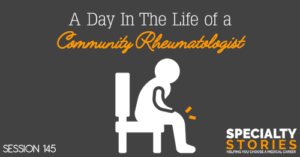Apple Podcasts | Google Podcasts

Session 145
Today, they explore the exciting field of rheumatology with Dr. Mohammad Ursani, a triple board-certified rheumatologist, author, ACR committee member, and researcher. He has been practicing for three years now talking about his journey to rheumatology.
For more podcast resources to help you along your journey to medical school and beyond, check out Meded Media. If you’d like to learn more about the specialty Rheumatology, check out the American College of Rheumatology.
Listen to this podcast episode with the player above, or keep reading for the highlights and takeaway points.
[01:31] Interest in Rheumatology
In his second year of residency, Mohammad initially wanted to have a background in molecular biology. So he initially wanted to do hematology oncology. At that time, there was a lot of immune targeting and advances in chemotherapy that was starting to become a little bit more involved in molecular biology and Immunology.
Then when Mohammad got exposed to rheumatology in residency, he fell in love with it. He realized it was within that same realm of molecular biology as well as immunology, targeting, and modifying cellular response and things like that.
The lifestyle and the disease processes jumpstarted Mohammad into looking at Rheumatology as opposed to hematology oncology.
He knew he didn’t want to do surgery and he never liked going to anatomy lab in terms of dissecting nerves and muscles and memorizing things. He thought it was a little bit more just straight verbatim memorization. Instead, he likes physiology because it just made sense to him. He could predict a response if he tried to understand the pathway and why things were happening.
[03:37] Traits that Lead to Becoming a Good Rheumatologist
Interestingly, there’s a huge gray zone with every pathology and with every case in rheumatology which can also be frustrating. Therefore, you have to have an inquisitive personality.
“You always have to be thinking outside the box as opposed to just being confined inside the box.”Click To TweetThere’s not one specific test that will diagnose one specific thing. There could be seronegative conditions meaning conditions that can still be diagnosed without a specific test or a specific antibody. So you always have to keep your guards up and always thinking of other possibilities, even though someone has an established condition.
[04:46] The Biggest Myth or Misconception Around Rheumatology
From an insurance perspective, a lot of people think one test will diagnose one condition. And undoing that mentality or thought process that patients have is very difficult.
The second thing is in terms of medical students and residents. A lot of the stigma on rheumatologic conditions has to do with people. And since they are chronic conditions, people feel like they never get better. They feel like these are debilitating conditions and people have a poor quality of life. Especially in this day and age, it’s not true because there are so many different conditions that have different treatments and people can live a relatively normal or good quality of life.
“A lot of people think one test will diagnose one condition. And undoing that mentality or thought process that patients have is very difficult.”Click To Tweet[06:09] Types of Patients
Mohammad did his training at Baylor. He thought he would see most of the oddball cases during his training at a large academic center. But he has not seen as much probably due to the overlapping conditions in the community. Nevertheless, he has seen anything from bread and butter rheumatoid arthritis or bread and butter lupus.
He will see people that walk in with bread and butter rheumatoid arthritis. Generally, their complaints are prolonged stiffness, prolonged joint pain, maybe a little bit of swelling that’s usually unresponsive to conservative treatments such as acetaminophen or non steroidal drugs.
“Generally, the patients are much younger as compared to the more typical osteoarthritis patient that’s in the 60s or 70s.”Click To TweetThen on the other end of the spectrum, you have people that have a condition characterized by an inflammatory response and overproduction of plasma cells. And it’s to a point where there is no ICD-10 code for it.
So it’s very difficult to get some of these therapies approved. Because if it’s so rare that it doesn’t have the ICD-10 code, then you have to kind of jump through hoops to actually treat these conditions.
All those being said, you have to have your ears perked up a little bit to make sure that you’re not missing anything. You have to always think outside the box before something becomes misdiagnosed or undiagnosed.
A lot of the time, patients either come for second opinions or they come with a prior diagnosis that is not accurate. Sometimes people will say that they’ve been told that they have rheumatoid arthritis. They’ve had a positive rheumatoid factor. It’s in the blood tests. But the reality is they have hepatitis C-related arthritis or hemochromatosis or Sjögren’s syndrome. And all those things can have a positive rheumatoid factor.
[09:42] Typical Day
His clinic hours start at 8:30. And usually the last deployment slot is around four o’clock. He also takes inpatient consults, so most of the time he tries to do that before the clinic starts. So he starts rounding around 7:45 at hospitals quite close to his clinic.
Then he sees about 20 to 25 patients a day in the clinic and usually gets back home in time before the evening. It’s not too terrible at all. He would usually have a follow up slot between 15 to 20 minutes, and then a new patient is about 30 minutes or so.
[10:38] Taking Calls and Life Outside of Hospital
“Luckily, one of the good things about rheumatology is that there's very little, if no overnight emergencies.”Click To TweetMostly it’s an outpatient branch of medicine. If there are inpatient consults, they’ll call them over the weekend. But it’s pretty reasonable.
Mohammad says he has life outside of the hospital as he gets to travel often, spend a lot of time with family, and still be able to do his hobbies.
[11:31] The Training Path
For adult rheumatology, you can either do internal medicine or you could do med-peds and then specialize in adult rheumatology. There’s also a pediatrics track where you’re either pediatrics or your med-peds and then you do pediatric rheumatology.
“Rheumatology fellowships are usually two years long.”Click To TweetThere are sometimes academic fellowships where you want to go into a specific study of vasculitis per se. There are additional fellowships that you can do, which are research-based. They’re at certain institutions where there are another year or two years to jumpstart your career in academic medicine or research.
[12:34] Community vs Academics
A lot of his decision to choose the community setting was influenced by the amount of student loan burden he had. He loved academics, but he wanted to prioritize paying off his student loans. Comparing the reimbursement or the salary from academics to some of the community offers he was getting, it was practically a one-sided offer due to the big difference.
There are other great options like public service loan forgiveness, which he wished he knew about. If that’s something you’re interested in, you could definitely start the process early. So by the time you finish residency and fellowship, you could knock out a lot of that 10-year period just within your training.
Unfortunately, he didn’t get on that bandwagon early enough into his career just because he wasn’t aware of it.
[13:44] Competitiveness of the Field
Traditionally, it was not as competitive as some of the other specialties like cardiology, GI, and pulmonary. But if you look at the trends over the last three or four years, it’s actually been a lot more competitive. There are a lot more applicants. The reason being is because the programs aren’t that big. There are not as many slots that would be in other fellowship programs.
“A lot of these conditions are starting to become more mainstream.”Click To TweetPeople are learning a lot more of these conditions and people are having a better quality of life despite having these conditions. Thanks to the therapies that they have, a lot of people are paying a lot more attention to rheumatology and Immunology in general.
[14:43] What He Wished He Knew that He Knows Now
Mohammad wished he knew how much of a role insurance companies play and and what a prior authorization was.
Having no training in that whatsoever, whether it’s medical school or residency or fellowship, he really thinks they should be training students and trainees. Or at least give them the low back exposure in terms of what insurance companies are and how they run before you just step out into practice and are expected to know all this on your own.
“Three or four of the top 10 most expensive medications that came out for 2020 were rheumatologic medications.”Click To TweetBeing high costs or high dollar drugs, there’s a lot of barriers to having them approved and being able to use them. So the patients are the ones caught in the middle of this whole process. Then they blame you because they think you’re the one getting all the money.
[16:22] Message to Future Primary Care Physicians
Steroid responsiveness does not mean that someone has something inflammatory. But that’s not always the case.
The second thing is about ordering tests. Just because someone has fatigue and someone in their 20s and 30s, shouldn’t warrant you to do a rheumatologic workup. They should really have more symptoms aside from just really big fatigue and hair loss or something like that.
“Be more aware of what the blood tests are and what they mean.”Click To TweetUltimately, be a little bit more aware of what different conditions present them would be very helpful prior to sending somebody to a rheumatologist for workup.
[18:02] Other Specialties They Work Closely With
The fun thing about rheumatology is that there’s a huge overlap with everything because all of their conditions are systemic. So they can theoretically involve any part of the body.
So he’s working with dermatologists, pulmonologist, nephrologist, and even often, ophthalmologists for things like uveitis, or sclerosis.
“It's a good specialty to build relationships with, especially if you're in the community.”Click To TweetA lot of the symptoms that people might require, for example, bronchoscopy to be done or, skin biopsy to be done or renal biopsy. So that’s one of the things he really likes about rheumatologist is that it’s truly a multi specialty approach. It’s not just one organ focus.
[18:58] Most and Least Like Things About Rheumatology
What he likes most about the field is the disease processes. They don’t know a lot about why autoimmunity occurs. So it encourages you to keep up to date with what’s going on in terms of literature and research.
You need to know that patients that had the same condition may not present the same way. For example, someone has the bread and butter version of rheumatoid arthritis. If someone says they have joint pain.
But there are plenty of rheumatoid arthritis patients that don’t have arthritic symptoms. They have UTI, so they have interstitial lung disease that’s related to rheumatoid arthritis.
“The wide spectrum of the conditions and different presentations that people have keeps everything so interesting.”Click To TweetThere’s also the satisfaction of being able to treat a lot of these people with these conditions that are known to be very debilitating in nature. In this day and age, being able to marry someone or having them, going out and playing with their kids or having them being able to get back to playing sports that they used to play. It’s a really satisfying feeling.
Conversely, what he likes the least is doing all the paperwork, especially with getting things approved and working with insurance companies to have medications approved.
[21:08] Major Changes Coming in the Field
“We’re all moving towards this concept of individualized medicine or personalized medicine.”Click To TweetRight now, there’s no known reason why some people respond to certain therapies and some people don’t. And why some people’s disease process is triggered by a certain pathway versus others is a different pathway.
Hopefully, there will come a time when they scan someone at baseline and be able to distinguish which pathway drives their rheumatoid arthritis. So they’re able to give you medication to block that pathway as opposed to cycling through different products and seeing what sticks.
[22:31] Final Words of Wisdom
If he had to do it all over again, Mohammad would still have chosen this field. Finally, if you might be interested in Rheumatology, you can increase your chance in matching by getting involved with some type of publication. It doesn’t need to be a large journal. It doesn’t need to be a large conference.
Check out local meetings or local American College of Rheumatology chapters or local state rheumatology chapters. A lot of the time they take poster board presentations or case reports and things like that. So one thing is to show interest in the field.
If you want to get more exposure to it, the elective is very short. A lot of times it’s like two to four weeks. So try to request an increased exposure through your program director or your program in general.
“Just see if it's possible to have a little bit more of a lengthy rotation because there's no way that you can get a feel of what rheumatology is in two weeks or four weeks at a time.”Click To TweetOtherwise, it’s a very fulfilling specialty. It’s a very needed speciality. They’re expecting a huge shortage in rheumatologists going forward so all the help is definitely welcomed.
Links:
SEARCH SITE
LISTEN FOR FREE











